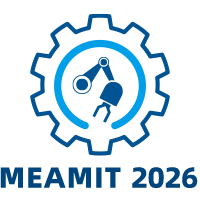Submission
Submission Instructions
.jpg)
.jpg)
.jpg)
.jpg)
- English is the official language, and the paper mustbe written in English only.
- A full Paper is required for publication purposes.
- An abstract is required for presentation purposes only.
- The submitted papers must be original and not under consideration elsewhere.
- Authors of formally accepted papers will be required to prepare a presentation, either as an onsite talk or a poster display. At least one author of each accepted paper must register for and attend the conference.
Submission Methods
- Please format your paper using the provided template.
- Template Download
- Please submit your full paper in both .doc & .pdf formats to the Submission System. Before submission, you must sign up or log in.
- Submission Link (For Chinese Authors)
- Submission Link (For International Authors)
More Information
Publication
All submissions will undergo a double-blind peer review by 2-3 experts in relevant fields. Acceptance will be based on the quality of the paper and satisfactory revisions in response to reviewers’ comments. Accepted papers, following proper registration and presentation, will be included in the conference proceedings and submitted for indexing in EI Compendex and Scopus.
Notes
Academic integrity represents the moral code and ethical policy upheld within academia, encompassing values such as honesty, rigor in research, the avoidance of cheating and plagiarism, and adherence to high academic standards. Scholars are expected to strictly follow these principles; failure to do so grants the review committee the authority to reject a paper outright during the review process. Given that databases are continuously updated, if plagiarism or a high repetition rate is later identified, the publisher reserves the right to reject the paper from publication. In such cases, the author bears full responsibility for any infractions.
Guidelines for Using Generative AI (GenAI) Tools in Manuscripts
Generative AI tools can assist in academic writing but must be used responsibly to maintain research integrity. Authors bear full responsibility for all manuscript content, including AI-generated material. Please follow these guidelines:
1.Language and Formatting:
GenAI tools (e.g., ChatGPT, Grammarly) may be used to improve grammar, spelling, and formatting. Authors must carefully review and edit all AI-generated content for accuracy and coherence.
2.Content Accuracy & Originality:
Verify the correctness of AI-generated text, citations, and data. Use plagiarism detection tools to ensure originality and avoid copyright issues.
3.Figures and Data:
Review AI-generated charts and visuals to ensure they accurately represent the original data and do not mislead.
4.Transparency and Disclosure:
Disclose the use of AI tools in the Methodology or Acknowledgements section, specifying the tool name, version, and specific use (e.g., language editing, data analysis).
5.No Data Fabrication or Manipulation:
Do not use GenAI to create, fabricate, or manipulate data or images in a way that distorts research results.
6.Limitations and Authorship:
GenAI tools cannot replace human research efforts or be credited as authors. Only human contributors responsible for the work should be listed as authors.
Contact Us
- Kunming, China
- +(86)14748150307
- meamit@163.com
